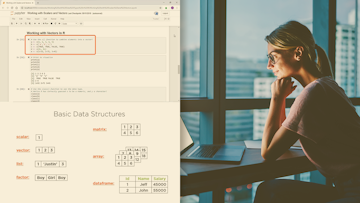
R is a popular programming language for statistical computing. In this course, Programming R Vectors and Factors, you will gain foundational knowledge of all data types and structures within R. First, you will learn some of the most commonly used data types and data structures used in R. Then, we will explore all of the data types and structures in R. Next, we will dive deeper into the specific data structures of vectors and factors. Finally, we will discover how to program and work with vectors and factors including accessing, adding and removing elements, using and understanding coercion and performing common operations on...
Read more
Good to know
Save this course
Activities
Career center
Data Scientist
Statistician
Actuary
Data Analyst
Financial Analyst
Market Researcher
Business Analyst
Software Engineer
Data Engineer
Quantitative Analyst
Risk Analyst
Economist
Biostatistician
Epidemiologist
Clinical Research Associate
Reading list
Share
Similar courses
OpenCourser helps millions of learners each year. People visit us to learn workspace skills, ace their exams, and nurture their curiosity.
Our extensive catalog contains over 50,000 courses and twice as many books. Browse by search, by topic, or even by career interests. We'll match you to the right resources quickly.
Find this site helpful? Tell a friend about us.
We're supported by our community of learners. When you purchase or subscribe to courses and programs or purchase books, we may earn a commission from our partners.
Your purchases help us maintain our catalog and keep our servers humming without ads.
Thank you for supporting OpenCourser.


